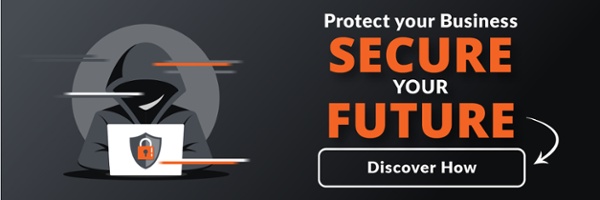
A World Without Cybersecurity: The Risks and The Consequences
Imagine this.
You wake up one morning and everything you know about life comes to a halt. All computers, servers, mobile devices, electronic systems, networks and data, or anything related to technology is under attack -- and you can't do anything about it.
There's panic across financial markets as banking systems and company investments take a plunge in their customers' accounts; large airports are shutting down as data breaches override their complex travel systems; subways, trains, schools, and stores all lock up and shut down operations from a video surveillance attack; the cars on the street begin crashing themselves as their smart systems get hijacked. The city shuts down; all warehouse and distribution centers stop working; hospitals and doctors' offices face technical problems accessing their patient's files; large corporations struggle to stay upright as confidential information is let loose; credit cards are hacked, bank accounts are empty, computer systems are untouchable, and histories and identities are lost.
Imagine that. That's what a world without cybersecurity would look like.
That's why it's important to implement cybersecurity practices into your business and daily life. Although we don't anticipate the damage before it happens, it's better to be proactive at the start. One way to do that is by establishing more security around information that needs greater protection. A single password won't do enough to ward off cybercriminals ready to wreak havoc in your computer systems and networks, so a great first step is to make yourself aware of who's attacking, what's at risk, and why you need cybersecurity.
What's At Risk?
It's easy to push aside the complexities of cybersecurity for your business, but here are some key items at risk without its protection:
- Any type of information protected by passwords
- Company hardware, software, and networks
- Customer social security numbers from your businesses' computer systems
- Confidential company information stored in the cloud
- Customer and company credit card information
- Company communication, entertainment, transportation, shopping, medicine, and all the personal information stored in them
- Relationships built with customers
- Company brand and reputation
- Money! It's a large expense recovering from a data breach
- Consumer trust
These are just a handful of the valuable items at risk if a cybercriminal ever entered into your business' computer systems. It's important information that could be lost if you aren't careful and aware of the different ways attacks could happen. Education, speculation, and knowing what to look for is a great place to start.
 Who's Attacking and How Do I Know?
Who's Attacking and How Do I Know?
Now that you realize what's at risk, it's necessary to be precautious on all devices. Cybersecurity attacks are an unwelcome attempt to steal, expose, alter, destroy, or disable any information through unauthorized access to computer systems. The motives behind each attack can vary, but the overarching reasons tend to fall into three categories: criminal, political, or personal. Typically, attackers perform these types of wars to seek financial gain through money theft, data theft, or business disruption. It's critical to spot a cyberattack early and know what you are looking for.
I Know What an Attack Looks Like, What About Security?
Knowing the risks of a cyberattack, you'll want to know how to combat it with cybersecurity. Cybersecurity consists of all technology and practices that keep computer systems and electronic data safe. The more files and information you convert online, the greater it is at risk of cybercrime, so you'll want to ensure confidentiality, integrity, and availability of information with the cybersecurity you have in place. Here is a list of cybersecurity practices your business can consider adopting:
- Application security
- Cloud security
- Infrastructure security
- Internet of Things security Iot
- Network security
- Storage security
- Mobile security
Each type of security protects areas in your business that contain valuable information to you and your customers. Even if there's passwords protecting these systems, that's just one layer that could easily be breached by the smartest cybercriminals. Therefore, it's best for your company to consider implementing multiple layers of security to promise you and your customer proper safety. There's several easy ways to start implementing more cybersecurity measures at your business.
The Cost of Not Having Cybersecurity
According to IBM , in 2020 alone, the average cost of a data breach (as a result of weak cybersecurity) was USD 3.86 million globally, and USD 8.4 million in the United States. These costs came from discovering and responding to the data breach, the cost of downtime and lost revenue, and the long-term repetitional damage to a business and its brand.
Studies conducted at Southern New Hampshire University proved that the need to protect confidential information is a pressing concern to the highest levels of governments and industries. With the luxury of technology, information can travel around the world, but doing so can come with high risks if it's not properly secured. As of 2021, there is a ransomware attack every 11 seconds, which is a dramatic rise from every 39 seconds (CISA). This means our systems are becoming more susceptible to criminals outsmarting our protection and wreaking havoc in our systems. Small businesses are at an even greater risk, being the target of nearly 43% of all cyberattacks. Investing in a cybersecurity expert is worth it for any business.
A good place to start is by doing your research. Find an organization that specializes in technology and software that can create the right security for you. In Time Tec offers specialized cybersecurity services that meet your business needs and ensures protection over what's most valuable to you: In Time Tec Cybersecurity.
A World With Cybersecurity
Reaching this point, you might have a clearer ideas on why your business, and the world, needs cybersecurity. It goes to show that it's a necessary facet in how we operate corporately and personally. And it's important to keep in mind that the smarter we become, the smarter cybercriminals become. So the need for cybersecurity is growing as new technologies are embraced and companies begin to trust more applications and systems with people's information. If you're now considering hiring a cybersecurity expert, there are several important things to keep in mind. Although the digitalized space is efficient and useful, it requires the upmost security that will mimic a lock and key to what's important to you.
So if we were to imagine a world without cybersecurity, it means there's too much trust. We need to distribute that trust accordingly and place it in the hands of those founded on integrity, trust, and putting people first.

